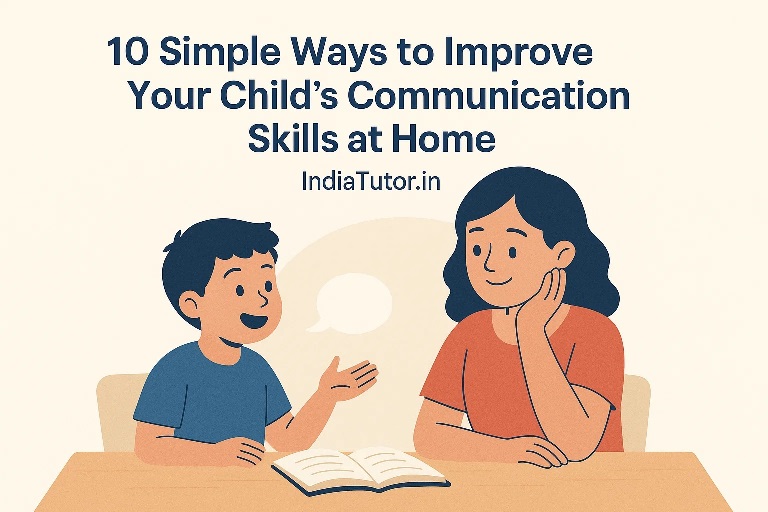As parents, one of the most valuable gifts we can give our children is the ability to communicate clearly and confidently. Communication skills not only help kids express their thoughts and feelings but also play a key role in academic performance, social relationships, and future career success.
A 2023 UNESCO report highlighted that children with stronger language skills perform up to 25% better in school assessments compared to peers with weaker communication abilities. Another study by the American Speech-Language-Hearing Association found that regular conversations at home significantly boost vocabulary and comprehension skills.
The good news is that communication can be nurtured at home with simple, everyday practices. Here are ten effective ways parents can help children build these essential skills.
1. Encourage Reading Aloud
Reading aloud is one of the most powerful ways to build vocabulary and pronunciation. Choose age-appropriate books and ask your child to read a few pages daily. Research from Scholastic’s Kids & Family Reading Report shows that children who read at least 15 minutes a day develop better comprehension and communication skills.
Tip: Take turns reading aloud with your child to make it interactive and fun.
2. Have Meaningful Conversations
Children learn communication by listening and speaking. Instead of asking “How was your day?” try open-ended questions like “What was the most interesting thing you did today?” These questions encourage kids to explain in detail, which builds confidence and clarity.
3. Practice Storytelling
Storytelling develops creativity, sequencing, and expression. Ask your child to narrate a story from their day, retell a favorite tale, or even create an imaginary one. Studies show storytelling improves both verbal fluency and listening skills.
4. Play Word Games
Games like Scrabble, Pictionary, or even simple “word of the day” challenges make vocabulary building exciting. According to a 2022 education survey, children who engage in word games score higher in language tests.
5. Limit Screen Time, Increase Talk Time
Excessive screen time can reduce opportunities for real conversations. The American Academy of Pediatrics recommends no more than one hour of screen time for children under 6, and encourages parents to engage in interactive activities instead. Replace some screen time with family discussions, debates, or board games.
6. Encourage Writing
Writing strengthens thinking and communication. Ask your child to keep a daily journal, write short stories, or even draft letters to friends and family. Writing helps them organize thoughts, improve grammar, and build confidence in expression.
7. Be a Good Role Model
Children imitate what they see and hear. When parents use polite, clear, and expressive language, children naturally pick it up. Demonstrating good listening, eye contact, and respectful speech sets the tone for effective communication at home.
8. Teach Active Listening
Good communication is not only about speaking but also listening. Practice activities like listening to an audio story and then asking your child to retell it. This improves attention span, memory, and comprehension.
9. Encourage Group Interaction
Invite friends, cousins, or neighbors for group activities. Children learn to take turns, listen to others, and respond appropriately in social settings. A study from Harvard’s Center on the Developing Child notes that peer interactions significantly strengthen social communication skills.
10. Celebrate Small Successes
Whether your child uses a new word, narrates confidently, or asks thoughtful questions, celebrate it. Positive reinforcement builds self-esteem and motivates children to keep improving.
My Thoughts
Developing strong communication skills in children is not about complicated lessons or expensive programs. It is about creating an environment at home where language, listening, and expression are part of daily life. With small but consistent efforts, parents can help their children become confident speakers, attentive listeners, and effective communicators.
At IndiaTutor.in, we believe communication is the foundation of lifelong learning. By practicing these simple methods, parents can ensure their children not only excel in academics but also build the confidence needed to succeed in every aspect of life.
By Nidhi Mehta – Founder – IndiaTutor.in
🔥 Post Engagement
👁️ 12 Total Views
🔥 1 Views Today
📈 12 Views Last 7 Days
Share:
WhatsApp | Facebook | Twitter | LinkedIn
To share your Feedback or Review – Contact Us
Are you a Tutor? Register your Tutor profile on India Tutor to connect with Students in India and Abroad.
Are you a Parent or Student? – Submit Tutor Wanted Form to reach relevant tutors registered on IndiaTutor.in.
Do you own a Tuition Center? Want to connect with students in your local area? List your center with us.
Free Online Self Evaluation Tests for Tutors and Students
Read our Reviews Have Questions? Read FAQs

